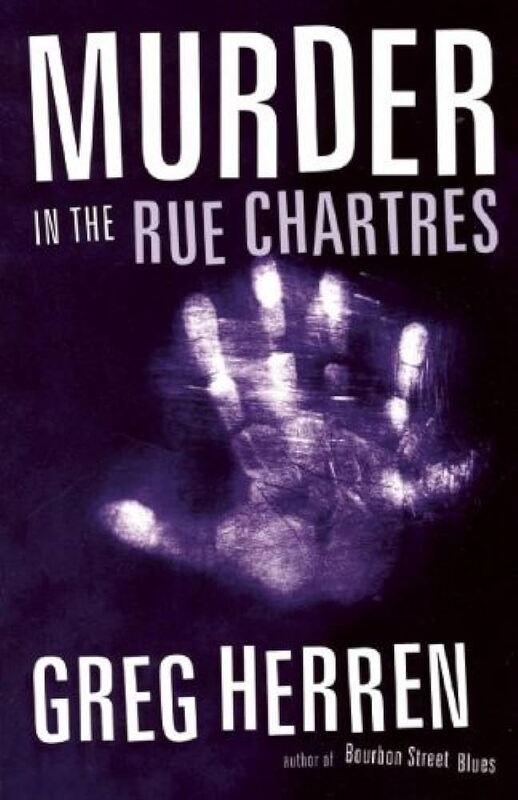Murder in the Rue Chartres
About the author
Greg Herren is a New Orleans-based author and editor. He is the author of ten novels, including the Lambda Literary Award winning Murder in the Rue Chartres, called by the New Orleans Advocate “the most honest depiction of life in post-Katrina New Orleans published thus far.” He is currently employed as a public health researcher for the NO/AIDS Task Force.
Summary
The narrative is divided into two halves: the first focusing on post-Katrina New Orleans, while the second delves deeper into the plot. Chanse returns to the devastated city with hopes of settling back in. However, his plans take a dramatic turn when he learns that Iris Verlaine, his last client before the hurricane, has been murdered; she hired him to find her missing father, Michael. He promptly agrees to assist his friends Venus and Blaine from the NOPD in their investigation. Meanwhile, Iris's brother, Joshua, hires Chanse to continue the search for their father.
As Chanse delves into the investigation, he uncovers a complex web of secrets and lies. The discovery of Joshua's abrupt murder adds a layer of urgency to his inquiries. Soon, revelations emerge that Michael was not only murdered but was also living a secret life as a gay man, leading to suspicions falling on Percy, his father-in-law, known for his strong anti-LGBTQ+ sentiments and overall crooked demeanor.
Chanse's investigation takes a surprising turn when he listens to an old recording between Iris and her long-institutionalized aunt. The recording unveils shocking truths: Percy's friend and assistant, Lenny, was responsible for Michael's murder, and Michael wasn't Iris's biological father. Just two days after Iris made contact with her aunt, she was murdered.
Confronting Percy, Chanse faces another twist when Lenny interrupts, confessing his love for Iris's mother, revealing himself as Iris's biological father, and admitting to the murders of Michael, Iris, and Joshua to protect his secret. In a tense moment, Chanse is forced to shoot Lenny to prevent further bloodshed. The book concludes with a poetic description of how Chanse seeks to rebuild his life in the city he loves.
Analysis
The book is obviously a fiction crime and mystery book for entertainment. But touching on post-Katrina and its impacts on the LGBT+ community in New Orleans is a highly significant social issue.
Cultural context
Katrina hit Southeastern states, affecting New Orleans in particular, in August 2005. By the end of August, 20% of the city was underwater. This natural disaster produced a public health emergency, leading to food and water shortages, bacteria rich floodwaters, destroyed residences, and extreme high temperatures. Many residents were required to evacuate, and damages amounted to more than $160 billion.
The population of the city fell by 29 percent between the Fall of 2005 through 2011. Despite the return of many residents, the city's population only reached around 400,000 by 2020, which was still about 20 percent lower than its population in 2000.
Works Cited
Britannica, The Editors of Encyclopaedia. "Hurricane Katrina". Encyclopedia Britannica, 30 Jan. 2024, https://www.britannica.com/event/Hurricane-Katrina. Accessed 1 March 2024.
Brownworth, Victoria A. “Greg Herren: More than Just Murder.” Philadelphia Gay News, 20 Jan. 2022, epgn.com/2022/01/19/greg-herren-more-than-just-murder/. Accessed 1 March 2024.
“Chanse MacLeod Series by Greg Herren”. www.goodreads.com/series/59775-chanse-macleod. Accessed 1 March 2024.
Jackson, Joy Juanita. "New Orleans". Encyclopedia Britannica, 1 Mar. 2024, https://www.britannica.com/place/New-Orleans-Louisiana. Accessed 1 March 2024.
“Murder in the Rue Chartres (Chanse MacLeod, #3).” Goodreads, www.goodreads.com/book/show/1225492.Murder_In_The_Rue_Chartres. Accessed 1 March 2024.
Yglesias, Matthew. “Hagee on Katrina.” The Atlantic, www.theatlantic.com/politics/archive/2008/03/hagee-on-katrina/45516. Accessed 1 March 2024.


